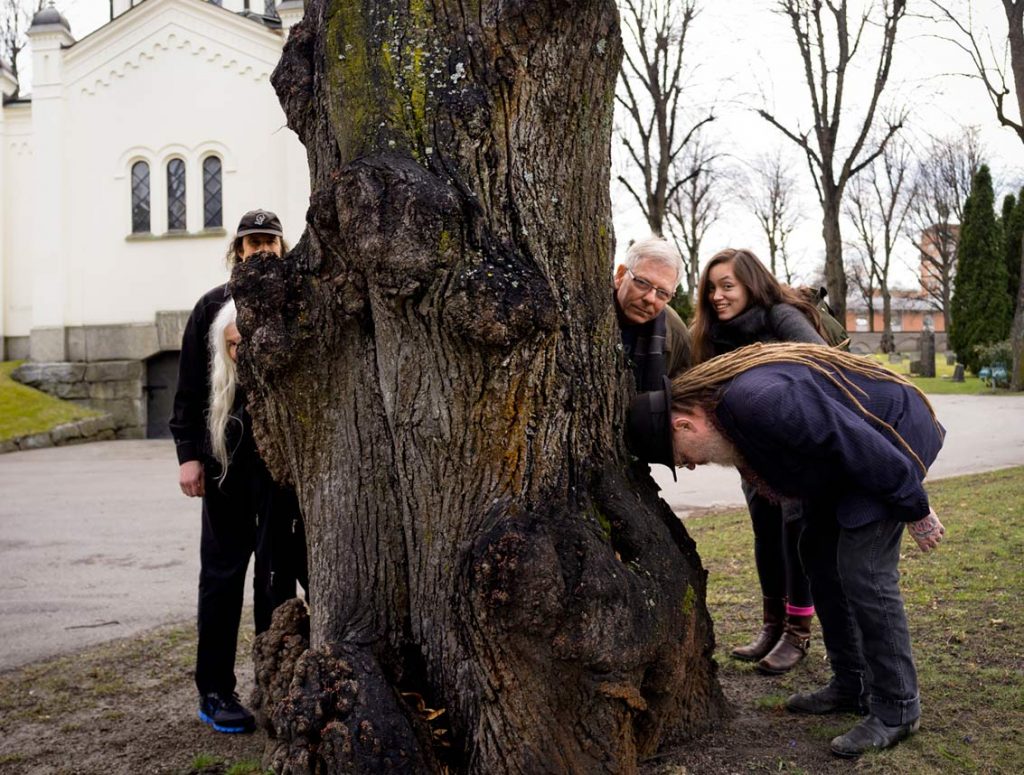DIY before it existed: An interview with Smegma
Few bands manage to exist over the course of decades. Smegma started forty years ago in Pasadena, California, when a few friends decided they wanted to be involved in music but not become musicians. Without managers or record labels, they’ve played their experimental music while sharing musicians with Frank Zappa and Captain Beefheart. Four decades on, they still bring their music out on cassette. This fall, Smegma plays their first European tour.
“People would throw stuff at us in the ‘70s,” Eric Stewart says over the phone from Portland. His wife, Jackie Stewart, also a member of Smegma, is in the next room. “Nowadays, an audience will just ignore you if they don’t like your show, but back then, they would get almost dangerous.”While Smegma’s mix of jazz, folk, rock music and noise didn’t always please their audiences, it certainly got the attention of trendsetters and music critics. In their early years, they had already collaborated with guest vocalist Wild Man Fischer from Frank Zappa’s band, and later they recorded with the Japanese noise pioneer Merzbow.real art
For Smegma, music works when it catches someone’s attention. “I try to make songs that someone would like to listen to for almost twenty minutes,” Eric says. “Something that won’t beat up your ears, that makes you still excited about it halfway through. That’s the real art, to record or make a product that doesn’t wear you out.”They aren’t an art project, like so many bands in the ’70s. But they do like to throw some experimentation into their music. They actively look for unexpected turns and a flow that doesn’t use the typical pop song structure. “You know that moment when a record player plays the same bit at the end of the record over and over, that annoying moment?” asks Jackie, who has been in Smegma since the late ‘70s. “I do it on purpose.”Jackie met Eric and the other band members in Portland, just after the band moved there in 1975. “Actually, in the ‘70s, Portland was still pretty conservative,” she says. “It used to be a teeny little place. There was just a small group of creative people. When someone new came around, you noticed there was someone new, you know? But somehow it changed… I have seen the change. It was starting in the ‘90s, but by 2003, there was definitely a different atmosphere. People started discovering new things. Right now it is a lot like paradise. I think it’s great that there’s so much more variety now. And that of course helps us,” she laughs, “we can play many more places now.”
Though they had difficulties in getting gigs over the years, they opted to not get a manager. Years before punk music invented the idea of do-it-yourself music making, they were already doing it. “The do-it-yourself thing is being childlike, it is not seeing the barrier if you haven’t done something before,” Eric says. “You can ask yourself: shouldn’t you learn your profession and then perform? We think not. Performing music is a laboratorium, it’s a big experiment and we’re gonna perform anyway. Of course there are reasons why you shouldn’t do it, but that’s the silliness of youth, not thinking there’s a barrier there. You’ll find in many other areas of life that it’s very foolish to be that way. But why not in music? Nobody gets hurt. So, in art, you can be very brave.”
cassettes
One of the most ‘foolish’ ways that Smegma still approaches their musical laboratorium? “We still use cassettes, and we like it,” Jackie says. “YES,” Eric says. “Like everybody else, there were a few times that I threw them away, thinking ‘I’m done with these’.”
“But they still sound so good!” Jackie says. “Recently, I put in a 1977 tape (Stiff Little Fingers on side A and some very, very early The Cure on side B) and it sounded just fine. And don’t forget you can still repair a cassette when it breaks.”
“It’s true,” Eric continues, “and if it wasn’t for the cassette, there was no Smegma. Before the cassette, there was no way for people to record themselves. Looking back, I realised that I was of the generation, when I was a kid in the ‘50s, that commercial tape recorders were cheap enough for people to buy for their kids; which is what my parents did. And I was so obsessed. It’s funny that nowadays people are still getting excited about cassette, just because it’s romantic. Today people have their mobile phones. Why would they use their phones so much for photos and less for sound? That’s the funny thing, the phone is not as romantic as tape. It’s foolish, haha. And cassettes will probably disappear for good, quite soon. But they were around at the right moment for us.”
Just like recording, playing a good show is a craft in its own right. Even though they’ve done it countless times, it hasn’t gotten any easier. And it shouldn’t, they think. Eric: “I’m always waiting for that moment that when you aren’t looking at the audience but you feel the concentration. You feel hyper-aware. There are people staring at you, willing you to make them feel something. It’s part of the craft to resist the moment of thinking ‘oh that’s neat’. Cause the moment you do that, you’ve ruined everything. You can’t be too self-aware, you just have to be there.”
Smegma plays at OCCII in Amsterdam on October 14th. See smegmamusic.com for more tour dates.
Er zijn weinig bands die zo lang bestaan. Smegma begon veertig jaar geleden in Pasadena, Californië, toen een groepje vrienden iets met muziek wilde, zonder muzikant te hoeven worden. Smegma heeft haar experimentele muziek ondertussen al veertig jaar zonder managers of platenmaatschappijen kunnen maken, terwijl ze muzikanten deelden met Frank Zappa en Captain Beefheart. Vier decennia later brengen ze nog steeds hun muziek uit op cassette. Dit najaar spelen ze hun eerste Europese tour.
“Mensen gooiden troep naar ons in de jaren 70,” zegt Eric Stewart over de telefoon vanuit Portland. Zijn vrouw, Jackie Stewart die ook bij Smegma zit, is in de kamer ernaast. “Tegenwoordig zou een publiek je gewoon negeren als ze je show niet goed vinden, maar in die tijd werden ze link.”Terwijl Smegma’s mix van jazz, folk, rockmuziek en noise, hun publiek niet altijd bekoorde, kreeg het wel de aandacht van trendsetters en muziekcritici. In hun vroege jaren werkten ze samen met de zanger Wild Man Fischer, uit de band van Frank Zappa, en later maakten ze opnames met de Japanse noisepionier Merzbow.echte kunst
Voor Smegma werkt muziek wanneer het de aandacht trekt. “Ik probeer nummers te maken waar iemand twintig minuten geboeid naar kan luisteren,” zegt Eric. “Iets wat niet oorverdovend is en wat je halverwege het nummer nog interessant vindt. Dat is echte kunst, om iets op te nemen wat je niet afmat.”Toch zijn ze geen kunstproject, zoals zo veel bands in de jaren 70 wel waren. Ze houden ervan om experiment in hun muziek te gooien. Ze zoeken actief naar onverwachte bochten en een flow die anders is dan de structuur van het doorsnee popnummer. “Ken je dat irritante moment van een platenspeler die blijft hangen aan het einde van de plaat?” vraagt Jackie, die in Smegma zit sinds de late jaren 70, “ik doe het expres.”Jackie ontmoete Eric en de andere bandgenoten in Portland, nadat de band daarheen verhuisde in 1975. “Eerlijk gezegd was Portland nog heel conservatief in de jaren 70,” zegt ze. “Het was maar een klein plaatsje. De groep creatievelingen was niet groot. Als er een nieuw iemand kwam, wist je meteen dat die nieuw was. Maar het is enorm veranderd… ik heb het zien veranderen. Het begon denk ik in de jaren 90, en rond 2003 was er al een compleet andere sfeer. Mensen begonnen nieuwe dingen te ontdekken. Op het moment is het bijna het paradijs. Ik vind het geweldig dat er zo veel variatie is. Dat helpt ons als band natuurlijk ook,” lacht ze, “we kunnen nu op veel meer plekken spelen.”Ook al hadden ze soms problemen met het vinden van shows, ze hebben er nooit over gepeinsd om een manager te nemen. Jaren voordat punkers met het idee van do-it-yourself kwamen, was Smegma dat al aan het doen. “De do-it-yourselfmethode is een beetje kinderlijk, je hebt iets niet eerder gedaan, maar je ziet dat niet als obstakel,” zegt Eric. “Je kunt jezelf dan afvragen: moet je iets niet eerst écht leren en erna pas gaan doen? Wij denken van niet. Muziek maken is een laboratorium, het is een groot experiment en we gaan hoe dan ook optreden. Natuurlijk zijn er redenen waarom je het niet zou doen, maar dat is de dwaasheid van de jeugd, die barrière niet zien. In allerlei andere domeinen van het leven is het onverstandig om zo te zijn. Maar waarom niet in de muziek? Niemand wordt pijn gedaan. In kunst kun je dus eigenlijk best dapper zijn.”cassettebandjes
Een van de meest dwaze dingen die Smegma doen? “We gebruiken nog altijd cassettebandjes, en we zijn er blij mee,” zegt Jackie. “YES,” zegt Eric. “Zoals iedereen hebben we een paar keer gedacht dat we er klaar mee waren, en waren we al een opruimactie begonnen.”
“Maar ze klinken nog zo goed!” zegt Jackie. “Pas nog deed ik een bandje uit 1977 in de cassettespeler (Stiff Little Fingers op kant A en wat supervroege The Cure op kant B) en het klonk prima. En vergeet niet dat je een cassettebandje kan repareren als het kapot gaat.”
“Dat is waar,” vervolgt Eric, “en als er geen cassettebandjes waren geweest, dan had Smegma niet bestaan. Voor de cassette hadden mensen niet de mogelijkheid om zichzelf op te nemen. Terugkijkend realiseer ik me dat ik van de generatie ben die als kind in de jaren 50 thuis een cassetterecorder had. Die was toen net goedkoop genoeg voor ouders om het voor hun kind te kopen, zoals mijn ouders ook hadden gedaan. Ik was zo geobsedeerd door dat ding. Het is grappig dat mensen tegenwoordig ook nog geïnteresseerd zijn in cassettebandjes, dat komt natuurlijk doordat ze zo romantisch zijn. Maar nu hebben mensen hun mobiele telefoons. Waarom gebruiken ze hun telefoons voor foto’s en niet voor het opnemen van geluid? Dat is bizar, maar een mobieltje is ook niet zo romantisch als een cassette. Het is dwaas, haha, en cassettes zullen binnen nu en niet al te lange tijd voorgoed verdwijnen, maar voor ons waren ze er op het juiste moment.”
Net als opnemen is het spelen van een goede show een kunst op zich. Ook al hebben ze het ontelbare keren gedaan, het is niet makkelijker geworden. En dat moet ook niet, vinden ze. Eric: “Ik hoop altijd op dat moment waarop je niet naar het publiek kijkt, maar wel de concentratie voelt. Je bent je overbewust van alles. Er kijken mensen naar je die willen dat jij ze iets laat voelen. Je moet op zo’n moment niet denken ‘O gaaf!’, want zodra je dat denkt heb je alles verpest. Je kunt niet te zelfbewust zijn, je moet er gewoon zijn.”
Smegma speelt in OCCII in Amsterdam op 14 oktober. Zie smegmamusic.com voor hun complete tourschema.

